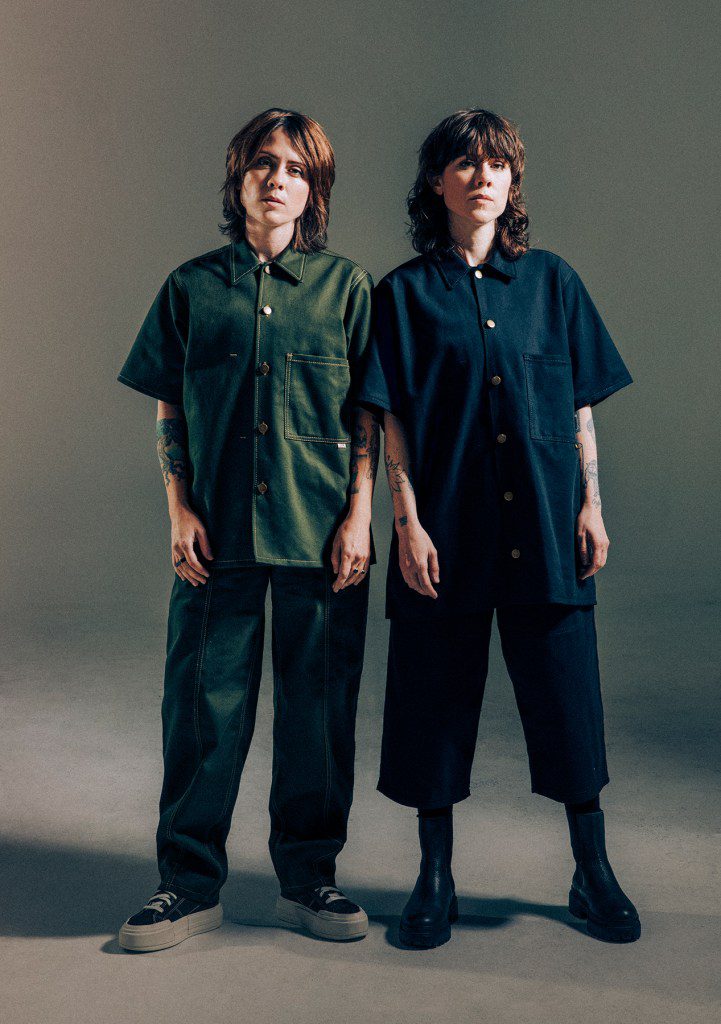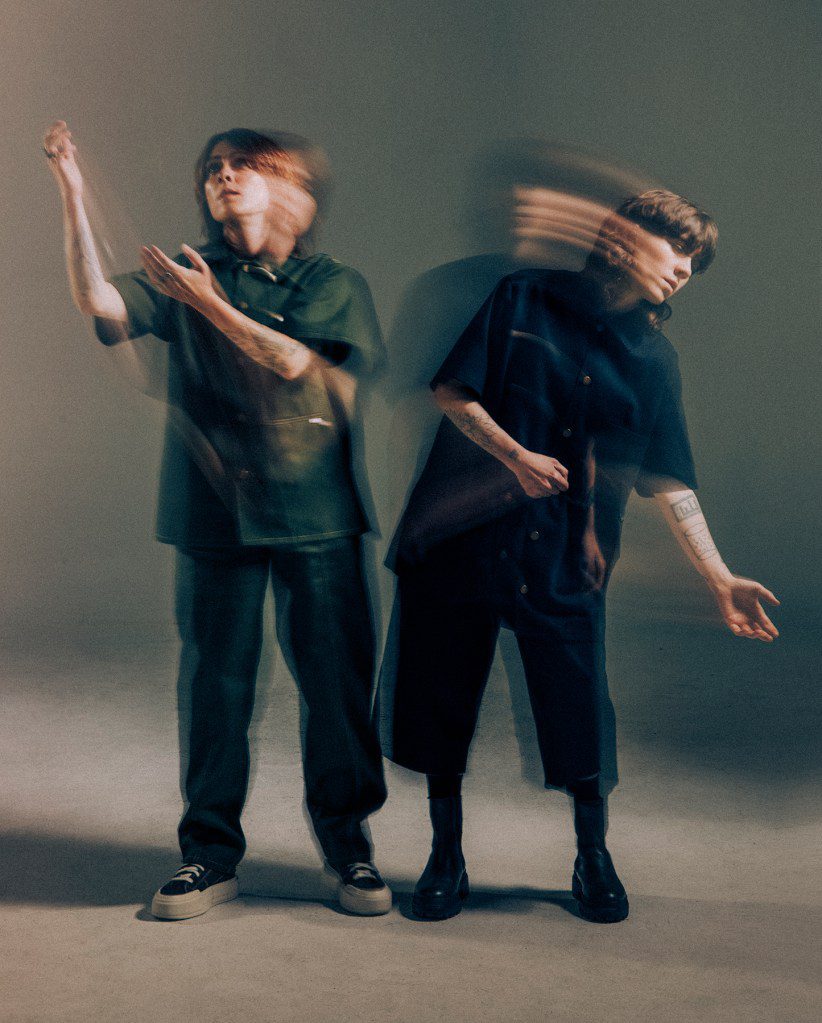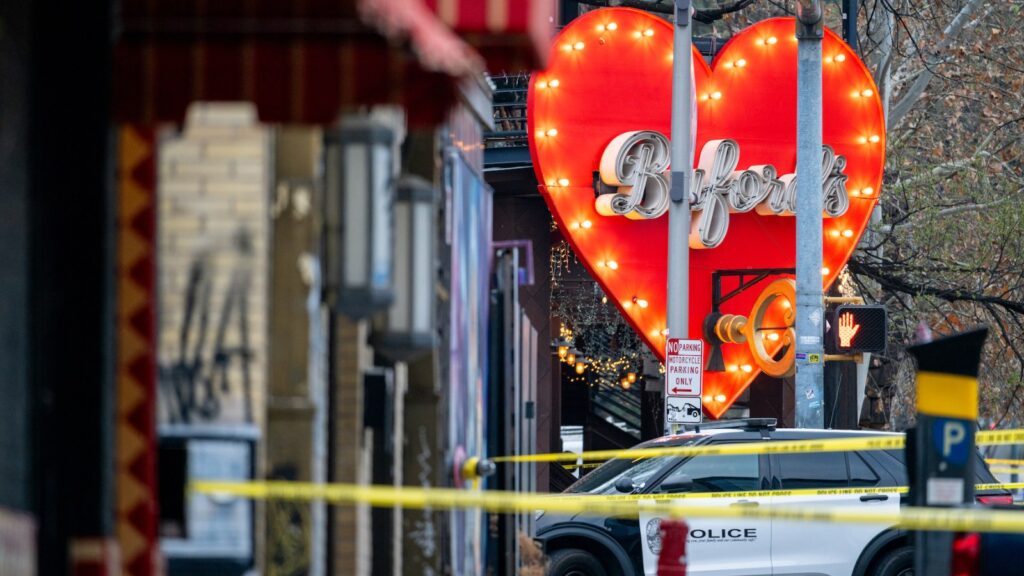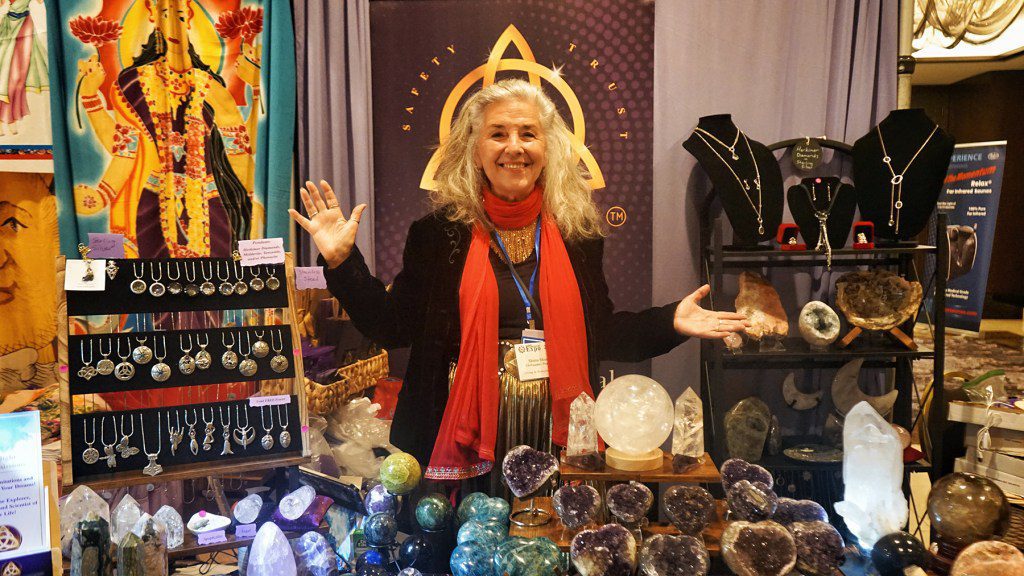A Stalker Haunted Tegan and Sara for Years. Now the Duo Is Speaking Out
Before Tegan and Sara Quin were the chart-topping sister act known for their genre-defying queer sound, they were twins from Calgary, Canada just utterly excited that they’d won a local music competition. One of their prizes for the 1998 victory was a headline set at a nearby pub, where 300 people moseyed in to see the 17-year-olds play their set. Afterward, a handful of fans lined up to purchase cassette tapes the two had made. It was the first time they had ever signed autographs. And for Tegan, it was the night she learned a lesson that’s followed her for two decades.
“There was something about people lining up to say hello and hug us and take our music with them that felt like it legitimized what we were doing,” Tegan tells Rolling Stone from her home in Vancouver, Canada. “We also received our first hate mail that day. They delivered it to the merch table at the show. It was an excellent first experience because ‘Welcome to your future.’”
In the 26 years since, Tegan and Sara have often wrestled with what fame and recognition mean for their reputations as alt-indie singer-songwriters. After releasing their debut album Under Feet Like Ours in 1999, the two toured for a steadily growing fanbase of queer teens and young adults. By their fourth album, 2004’s So Jealous, the duo had received critical attention, launching them onto a new stage of their career with hundreds of festival appearances and opening gigs with artists like Fun, Lady Gaga, and Katy Perry. But while fans delighted in the mainstream growth of their favorite band, behind the scenes, Tegan and Sara were dealing with a problem no one really knew how to handle: an imposter. And their new documentary Fanatical: The Catfishing of Tegan and Sara, directed by Erin Lee Carr, the pair take viewers on a first-hand ride of how the experience changed their career — and why they hope their harrowing experience could transform how celebrity takes shape in the digital age.
It began as a fake Facebook account claiming to be Tegan. Tegan and Sara’s team — initially believing it to be an outlier — referred to the account as Fake-Tegan, or Fegan. But as more fans began coming forward to say they had months-long relationships with a person they thought was Tegan, the urgency to find Fegan escalated. It eventually devolved into a years-long investigation that left not just Tegan and Sara, but managers, collaborators, and even close friends and family scared they were being hacked — or worse. In today’s digital age, impersonators are so common that they’re considered a natural extension of fame — a small con that accompanies money, acclaim, and stardom. But in 2011, the era of Facebook and LiveJournal and blogs, people were only just starting to comprehend the world of digital safety. So when Fegan appeared, Tegan and Sara were at a loss for what to do — and had no one on the outside who could relate.
“Nowadays it’s just part of the commentary. So many artists speak about this,” Tegan says. “Back then no one even understood what this was and there was no place to talk about it. It was heavy to carry at the time. Now, I feel like I can expel some of the grief and fatigue and frustration and guilt and responsibility because I have context and so does the world on what this is. But back then, I just felt ashamed and just thought, ‘Please let it end.’”
Trevor Brady for Rolling Stone
Looking back, Tegan realizes that her first reaction to learning she had an impersonator was a bit “histrionic.” It was 2011 and she was in Los Angeles at a birthday party for her friend, comedian and future Dead To Me creator Liz Feldman, when Sara called and let her know that someone had been impersonating her online. That night she learned she had more than an imposter. Fegan had access to unreleased demos, Tegan and Sara’s personal information, passport photos, full control of email accounts, even their mother’s medical information — and were using it all to catfish dozens of fans into believing they were Tegan.
“I’d only been living in L.A. for a couple years, and we’d just moved into this apartment maybe six months before that. It was my first night alone there,” Tegan says. “My partner was away and I remember pushing my dresser in front of the door. Who was I protecting myself from? I don’t know, but I started to feel very anxious and nervous about my safety and security at that moment. I just remember it being chaos.”
Tegan wasn’t the only victim — and she wasn’t the only one who felt immediate repercussions from Fegan’s actions. Sara had always been the more shy, reserved twin, especially when it came to interacting with fans. And when their management told her about Fegan, Sara says it confirmed everything she was already feeling about being perceived in public — and made her even more skeptical of the celebrity they were beginning to see take off. “At some point, I remember being like, I’m gonna have to write down my new email address on a piece of paper and put it in the mail and send it to my managers. That’s how paranoid I remember feeling,” Sara says. “I was like, ‘Lock it down.’”
Fanatical takes an in-depth look into the immediate fallout of the stalker, charting the emotional toil the unknown fan took on Tegan and Sara. For Carr, both a twin and a former teenage Elliot-Smith fan, the director knew that a lot of Tegan and Sara’s appeal to their early fans came from their accessibility. “In college when I was listening to Tegan and Sara and as a young queer woman, I was obsessed. I knew most of their albums by heart,” Carr tells Rolling Stone. “There [weren’t] a lot of out queer women that were doing what they were doing and being rock stars. And you could contact them.”

Trevor Brady for Rolling Stone
But the same relatability had implications for how Sara felt about their career. “Combined with the internet message boards, comment sections on websites, all of that stuff started to make me feel really uncomfortable. It felt really toxic,” Sara says. “When Fegan happened, I was upset and terrified, but it also confirmed something that I already was feeling, which was a desire to put a bigger boundary around us and our personal lives. Sometimes it felt like community. There was something beautiful about it. But it seemed like it was always right on the edge of curdling. Like it would only take one bad actor.”
The documentary also interrogates the music climate that allowed the hacker to thrive in the first place, and how so many fans got conned because they were actively searching for Tegan and Sara’s information in the first place — a tense confrontation that’s allowed Tegan some closure in the saga.
“I have a complicated relationship with this story, because I have a complicated relationship with the victims,” Tegan says. “The victims are victims and it’s awful it happened. It’s a violation. But most of them were out there trying to get my personal information off the internet. And so many of them acknowledged they were violating my privacy too. And I was just able to access so much compassion that it spilled over even to fake Tegan.”
The sisters describe their rising fame as something both exciting and devastatingly claustrophobic. It’s an experience that a select view of people can truly relate to, which left them feeling alone and isolated. But they point to people like Phoebe Bridgers, Mitski, and Chappell Roan as examples of how modern artists are demanding respect and boundaries from their fans. “I don’t know what Chappell is truly going through so I have a lot of empathy, because it seems like it’s a tremendous stress and anxiety and pressure on her,” Sara says. “What I will say is, I’m thinking, ‘How do we change this institutionally?’ I don’t know if it’s enough to say to fans, ‘Hey, yo, don’t act insane. Like, what are you doing?’ But if we zoom out, what are we doing, culturally, socially, institutionally, that is making this okay?
For Tegan, it’s a clear — if small — sign of the changing times. And she says she deeply supports the next generation of artists who say what’s on their mind, and hope people can think of that context when they watch the film. “[Celebrity] an unnatural thing,” Tegan says. “And I think Erin was able to ask a bigger question, which was, ‘What is our responsibility as human beings to each other in these kinds of situations? And, as a society, are we comfortable with where we’ve gotten when it comes to parasocial relationships and entitlement and fan behavior and celebrity and social media?”
The saga of Fake Tegan happened in an early era where internet stalking wasn’t seen as incredibly dangerous, and where artists like Tegan and Sara had few resources to deal with a situation that plagued them for years without answers. Tegan, specifically, is also very aware that fans might react poorly to online collectives being criticized, especially since they’re often credited for providing friendship and community to queer teens. But as the premiere of the documentary looms, she hopes that people who watch the film can acknowledge the people — not the stars— at the center of it.
“I believe the people who have followed me home or followed me to a hotel or who said shitty things about me online, truly don’t think that any of those things affect me,” Tegan says. “So I hope when people watch this film, you ask yourselves hard questions. I don’t necessarily think most people will, and that’s okay, but I hope that they certainly consider their own actions in their own life. Words matter. How we treat people matters.”





